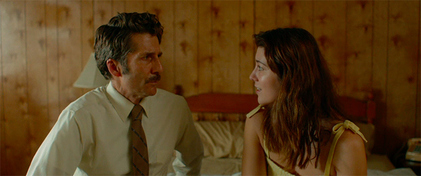
Cults used to enjoy a bit more focus in film, particularly throughout the 70s, most likely a reaction to the public’s shock at and curiosity with the seemingly heightened concern in cult activity, seen most notably in the Manson Family murders and the Jonestown massacre. Suddenly cults were all over the place in film, from Rosemary’s Baby to The Omen, from The Wicker Man to Apocalypse Now. Activity and interest seemed to subside from mainstream media consciousness, only briefly coming back again when the Branch Davidians at Waco were spread across the news in the aftermath of an FBI siege in 1993. However, nearly two decades on, the notion of cults has crept back into film. 2007’s Borderland, 2011’s Red State and 2013’s The Sacrament all take audiences into the dark heart of religious indoctrination, with decidedly gruesome results. Even the less grisly stories, like Martha Marcy May Marlene and The Master, have looked into the psychological damage wrought upon the victims of cults and their leaders. With the latest offering into this sub-sub-genre of films about cults, writer-director Riley Stearns has crafted an impressively controlled debut feature in Faults.

In Ansel Roth, Leland Orser finds not only a lead role that so rarely crosses the perpetual character actor’s path, but a role that rarely finds the focus as a lead at all. Roth starts his time with us as a jerk. Not just a jerk, but an unapologetic, unbearable prick. The kind of guy who makes his meagre way through the world on minor cons and what little grace the faded spectre of his former fame can afford him. Once renowned as an expert on cults and behavioural deprogramming, a man who made his name and career on seeing the ways in which people can be exploited, he’s now a shell of his former self, an apathetic burnout trying to stay afloat in a world that barely remembers him. And Orser does some wonderful work in the guise of Roth. Throughout his career, Orser has turned out a line of characters defined by strain and anguish, and he channels all this through his disgraced deprogrammer and giving it the extra edge of an earned misanthropy and cynicism.

Faults is a solidly engaging film, though its ending may have its detractors, with some potentially finding it a little unsatisfying (though not without weight, the lack of which would be a far greater crime). The two excellent lead performances from Orser and Winstead keep the film alive, and Stearns’ direction ably handles the steady progression from dark comedy to something that’s more of the former and less of the latter. If this is the starting standard of the filmmaker’s work, it shall be interesting to see what Stearn’s shall bring us for his second film.

 RSS Feed
RSS Feed
